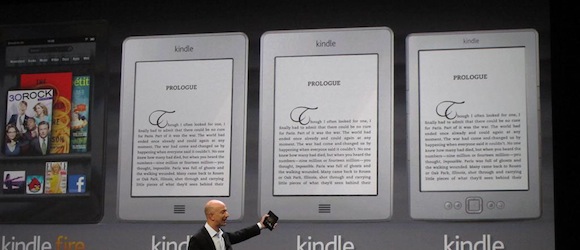If This Lawsuit Succeeds, It Could Break Amazon’s Dominance of the eBook Market
Inside of a dog it's too dark to read

The new and growing market for eBooks has allowed companies to call into question some of the basic and universal characteristics of reading and owning books. That you can loan them to your friends, for example, or that by purchasing a book you’re also purchasing the ability to read it whenever you want, wherever you want, until you lose it, donate it, give it away, or wear through its well-loved spine.
eBook publishers have, to put it mildly, established that these are qualities of a book that they do not intend to carry over to the new format, which is to a certain extent fine, so long as consumers know what they’re getting into. But the eBook market also has other problems, namely accusations of price fixing, and, due to the combination of software that limits the kind of device a given eBook can be read on and the dominance of the Kindle over the eReader market, bullying tactics. A new lawsuit filed by three independent bookstores is looking to strike at the heart of the problem: the insistance of eReader makers that their books should not be readable on other devices.
Amazon has not hesitated to use the fact that 60% of all eBooks are sold in their Kindle format to intimidate small publishers. When the policies of its closest competitor, Apple, were accused of causing price fixing among Apple and five major book publishers by the Department of Justice, Amazon just happened to lower the prices of its eBooks across the board, some by a third, the next day. The retail giant is generally understood to be able to fluctuate the prices on its eBooks all it wants: its take of the market share is so great that its losses are minimal, compared to the work lowering those prices does to promote Kindle sales, which in turn increase its market share. It’s book publishers and book stores that wind up losing either way.
From HuffPo:
The bookstores making the complaint are the Book House of Stuyvesant Plaza, based in Albany, N.Y., Fiction Addiction in Greenville, S.C., and Posman Books of New York City, though the suit states that these stores are suing on behalf of “all independent brick-and-mortar bookstores who sell e-books…”
“We are seeking relief for independent brick-and-mortar bookstores so that they would be able to sell open-source and DRM-free books that could be used on the Kindle or other electronic ereaders,” [Alyson Decker, lead counsel in the suit] explained.
What the suit is looking for isn’t actually for all eReaders to adopt an open-source eBook format, one that would be editable and available in its source code to all of its users. Instead it wants eReaders to adopt single eBook format, so that the sale of eReaders would become divorced entirely from the sale of eBooks. The price or selection of eBooks available on a given eReader would no longer be a factor in choosing which to buy, and eReader companies would no longer have any power to hold over book publishers, putting them in essentially the same boat as brick-and-mortar stores when it comes to obtaining their “inventory.”
The suit might be a longshot, but it would certainly make a lot of changes in the eBook market, maybe even for good. I’m not sure, though, how much of a market there is for eBooks in a physical bookstore, but I imagine there are a lot of librarians out there practically salivating at the idea.
(via HuffPo.)
Have a tip we should know? tips@themarysue.com